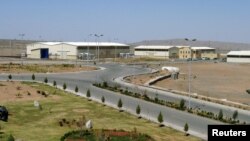An Iranian air defense test on Saturday in the Natanz region of central Iran caused an explosion heard as far as 20 kilometers from the Chahid Ahmadi-Rochan nuclear complex, according to a military official and local media.
"An hour ago, one of the region's missile systems was tested to assess readiness on the ground, and there is nothing to fear," said army spokesperson Amir Tarikhani on state television.
A "defensive missile was fired in order to test a rapid reaction to a possible attack," said Iribnews, the television site.
The explosion was heard in the sky over the town of Badroud, 20 kilometers from the nuclear power plant, according to the official Irna news agency.
Iranian news agencies earlier reported a large explosion in the sky above Natanz but said there was no official explanation of the incident.
The semi-official Fars news agency quoted its reporter in nearby Badroud as saying a short blast was heard that was accompanied by an intense light in the sky.
The Islamic Republic says its nuclear ambitions are peaceful.
"The residents of Badroud heard the noise and saw a light coming from an object that had just exploded in the sky of the city," a witness told the agency.
The Iranian military's test comes as talks to save the 2015 Iran nuclear deal resumed in Vienna on Monday after several months.
Negotiations are taking place between Iran and the major powers still party to the agreement, Germany, France, United Kingdom, Russia and China, after the United States withdrew from the pact in 2018 under the presidency of Donald Trump.
This agreement offered Tehran the lifting of part of the sanctions stifling its economy in exchange for a drastic reduction in its nuclear program and placing under strict U.N. control.
On April 11, the Iranian Atomic Energy Organization (OIEA) reported an accident that caused a power failure at its uranium enrichment plant in Natanz, one of the places central to the country's nuclear program, accusing Israel of being behind it.
This factory had the new cascades of centrifuges banned by the Vienna Agreement that had been put into service the day before.
Israel has repeatedly stated that it is ready to use any means, including force, to prevent Iran from acquiring a nuclear weapon capability, and Iran has carried out periodic exercises to improve the defenses around its nuclear sites.





